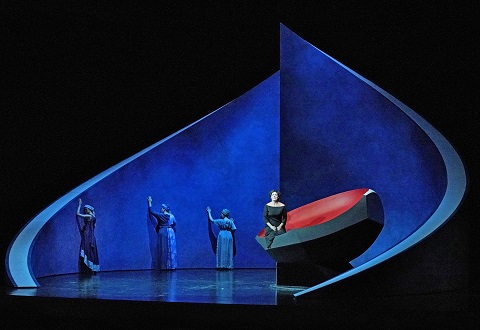
03 Aug 2018
Santa Fe: Continuing a Proud Strauss Tradition
Santa Fe Opera has an enduring reputation for its Strauss, and this season’s enjoyable Ariadne auf Naxos surely made John Crosby smile proudly.
English Touring Opera are delighted to announce a season of lyric monodramas to tour nationally from October to December. The season features music for solo singer and piano by Argento, Britten, Tippett and Shostakovich with a bold and inventive approach to making opera during social distancing.
This tenth of ten Live from London concerts was in fact a recorded live performance from California. It was no less enjoyable for that, and it was also uplifting to learn that this wasn’t in fact the ‘last’ LfL event that we will be able to enjoy, courtesy of VOCES8 and their fellow vocal ensembles (more below …).
Ever since Wigmore Hall announced their superb series of autumn concerts, all streamed live and available free of charge, I’d been looking forward to this song recital by Ian Bostridge and Imogen Cooper.
The Sixteen continues its exploration of Henry Purcell’s Welcome Songs for Charles II. As with Robert King’s pioneering Purcell series begun over thirty years ago for Hyperion, Harry Christophers is recording two Welcome Songs per disc.
Although Stile Antico’s programme article for their Live from London recital introduced their selection from the many treasures of the English Renaissance in the context of the theological debates and upheavals of the Tudor and Elizabethan years, their performance was more evocative of private chamber music than of public liturgy.
In February this year, Albanian soprano Ermonela Jaho made a highly lauded debut recital at Wigmore Hall - a concert which both celebrated Opera Rara’s 50th anniversary and honoured the career of the Italian soprano Rosina Storchio (1872-1945), the star of verismo who created the title roles in Leoncavallo’s La bohème and Zazà, Mascagni’s Lodoletta and Puccini’s Madama Butterfly.
Evidently, face masks don’t stifle appreciative “Bravo!”s. And, reducing audience numbers doesn’t lower the volume of such acclamations. For, the audience at Wigmore Hall gave soprano Elizabeth Llewellyn and pianist Simon Lepper a greatly deserved warm reception and hearty response following this lunchtime recital of late-Romantic song.
Collapsology. Or, perhaps we should use the French word ‘Collapsologie’ because this is a transdisciplinary idea pretty much advocated by a series of French theorists - and apparently, mostly French theorists. It in essence focuses on the imminent collapse of modern society and all its layers - a series of escalating crises on a global scale: environmental, economic, geopolitical, governmental; the list is extensive.
For this week’s Live from London vocal recital we moved from the home of VOCES8, St Anne and St Agnes in the City of London, to Kings Place, where The Sixteen - who have been associate artists at the venue for some time - presented a programme of music and words bound together by the theme of ‘reflection’.
'Such is your divine Disposation that both you excellently understand, and royally entertaine the Exercise of Musicke.’
Amongst an avalanche of new Mahler recordings appearing at the moment (Das Lied von der Erde seems to be the most favoured, with three) this 1991 Mahler Second from the 2nd Kassel MahlerFest is one of the more interesting releases.
‘And there was war in heaven: Michael and his angels fought against the dragon; and the dragon fought and his angels, And prevailed not; neither was their place found any more in heaven … that old serpent … Satan, which deceiveth the whole world: he was cast out into the earth, and his angels were cast out with him.’
If there is one myth, it seems believed by some people today, that probably needs shattering it is that post-war recordings or performances of Wagner operas were always of exceptional quality. This 1949 Hamburg Tristan und Isolde is one of those recordings - though quite who is to blame for its many problems takes quite some unearthing.
There was never any doubt that the fifth of the twelve Met Stars Live in Concert broadcasts was going to be a palpably intense and vivid event, as well as a musically stunning and theatrically enervating experience.
‘Love’ was the theme for this Live from London performance by Apollo5. Given the complexity and diversity of that human emotion, and Apollo5’s reputation for versatility and diverse repertoire, ranging from Renaissance choral music to jazz, from contemporary classical works to popular song, it was no surprise that their programme spanned 500 years and several musical styles.
The Academy of St Martin in the Fields have titled their autumn series of eight concerts - which are taking place at 5pm and 7.30pm on two Saturdays each month at their home venue in Trafalgar Square, and being filmed for streaming the following Thursday - ‘re:connect’.
The London Symphony Orchestra opened their Autumn 2020 season with a homage to Oliver Knussen, who died at the age of 66 in July 2018. The programme traced a national musical lineage through the twentieth century, from Britten to Knussen, on to Mark-Anthony Turnage, and entwining the LSO and Rattle too.
With the Live from London digital vocal festival entering the second half of the series, the festival’s host, VOCES8, returned to their home at St Annes and St Agnes in the City of London to present a sequence of ‘Choral Dances’ - vocal music inspired by dance, embracing diverse genres from the Renaissance madrigal to swing jazz.
Just a few unison string wriggles from the opening of Mozart’s overture to Le nozze di Figaro are enough to make any opera-lover perch on the edge of their seat, in excited anticipation of the drama in music to come, so there could be no other curtain-raiser for this Gala Concert at the Royal Opera House, the latest instalment from ‘their House’ to ‘our houses’.
"Before the ending of the day, creator of all things, we pray that, with your accustomed mercy, you may watch over us."

Santa Fe Opera has an enduring reputation for its Strauss, and this season’s enjoyable Ariadne auf Naxos surely made John Crosby smile proudly.
The late Mr. Crosby founded the festival, of course, and Ariadne was included in the inaugural line-up. By the time he retired, Maestro had conducted some 567 performances, 171 of them Strauss operas. This new production is the fourth in the work’s history here, and makes a solid case for the opus. From first to last, the cast is peopled with some of the leading practitioners in the field.
Amanda Echalaz is quite a galvanizing presence as Ariadne, her dark-hued, voluminous soprano a mighty force to be reckoned with. This is an instrument of not only immense power, but also possessed of a warm elegance. Ms. Echalaz is capable of pinning you back in your seat one minute with imperious suffering, and tug at your heart the next with exceedingly persuasive pianissimi.
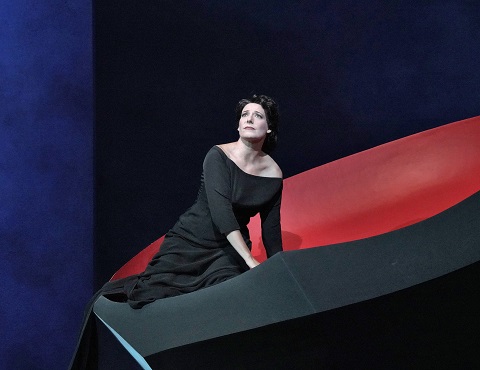 Amanda Echalaz (Prima Donna/Ariadne). Photo credit: Ken Howard for Santa Fe Opera 2018.
Amanda Echalaz (Prima Donna/Ariadne). Photo credit: Ken Howard for Santa Fe Opera 2018.
Like other notable large voices, the outpouring of rich sound can sometimes supersede the enunciation of every consonant, and an occasional unsteady soft high note betrayed her otherwise sound musical technique. Nonetheless, this was a pleasing and effective role traversal that aspired to sweep all before it.
Liv Redpath was quite an accomplished Zerbinetta, with a virtuosic command of coloratura, a decent sense of comedy, an endearing charisma, and a crystalline tone that proved a winning combination. The slight graininess to her fluty soprano makes it fall very engagingly on the ear, but a generalized stage presence meant that a very conscientiously vocalized Großmächtige Prinzessin fell just the short of the tour de force it can be.
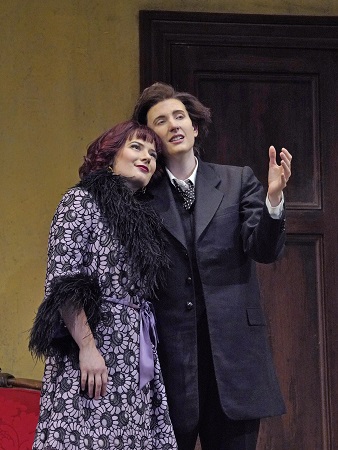 Liv Redpath (Zerbinetta) and Amanda Majeski (Composer). Photo credit: Ken Howard for Santa Fe Opera 2018.
Liv Redpath (Zerbinetta) and Amanda Majeski (Composer). Photo credit: Ken Howard for Santa Fe Opera 2018.
Bruce Sledge brought a highly attractive, clarion tenor to the role of Bacchus. Mr. Sledge’s generous, freely produced tone was wedded to a rock solid technique that allow him to assay a very pliant reading of this notoriously difficult sing. I have rarely heard anyone craft such gorgeous, arching, urgent phrases in this part. I hope he paces himself in his career to be around for many years, because this repertoire needs him now.
As the commedia quartet, pride of place must be given to the endearingly personable Harlequin of Jarrett Ott. The young baritone is at a breakthrough moment in his career thanks to various high vis projects, and he gifts this current role with a richly suave baritone, handsome demeanor, lively stage presence, and infectious sense of fun. Strauss gives Harlequin several chances to shine, and shine Jarrett Ott emphatically does.
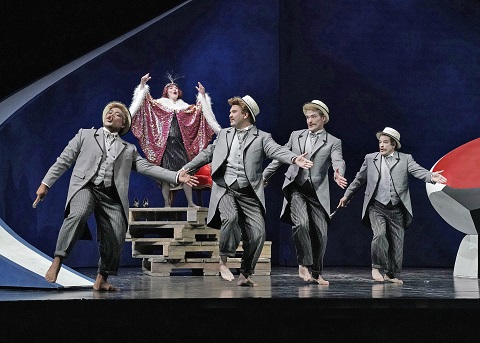 Terrence Chin-Loy (Brighella), Liv Redpath (Zerbinetta), Anthony Robin Schneider (Truffaldino), Jarrett Ott (Harlequin), and Matthew DiBattista (Scaramuccio). Photo credit: Ken Howard for Santa Fe Opera 2018.
Terrence Chin-Loy (Brighella), Liv Redpath (Zerbinetta), Anthony Robin Schneider (Truffaldino), Jarrett Ott (Harlequin), and Matthew DiBattista (Scaramuccio). Photo credit: Ken Howard for Santa Fe Opera 2018.
Not to be outdone, Anthony Robert Schneider’s mellifluous bass enlivened Truffaldino, Matthew DiBattista’s substantial tenor was a perfect fit for Scaramuccio, and tenor Terence Chin-Loy’s gleaming tone successfully caressed Brighella’s high-flying passages. Together, the four of them were a well-oiled machine, strutting, dancing, cavorting and of course, singing remarkably well. On the distaff side of the “opera” proper, Meryl Dominguez (Najade), Samantha Gossard (Dryade) and Sarah Tucker (Echo) provided consistently alluring singing, whether singly or together.
If anyone owned the Prologue, it was likely veteran Rodney Gilfry, giving a bravura performance as the put upon Music Master. Mr. Gilfry was in fine fettle, his robust baritone rarely sounding better. His commitment and animation dominated his every scene. That is not to diminish the dynamic accomplishment of Amanda Majeski as the earnest, anguished Composer. While I tend to prefer a mezzo in this part, Ms. Majeski’s compelling, penetrating soprano made a fine case for the role. I only wished her interpretation had been a bit less relentless and a mite more nuanced.
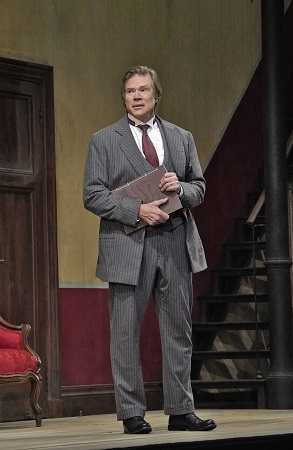 Rod Gilfry (Music Master). Photo credit: Ken Howard for Santa Fe Opera 2018.
Rod Gilfry (Music Master). Photo credit: Ken Howard for Santa Fe Opera 2018.
In a spoken role, Kevin Burdette provided a Masters Class in condescension as the amusingly smug Major-Domo. Brent Michael Smith’s luxurious bass served up solid singing as the Footman, while Jarrett Logan Porter’s warm baritone made for a pleasant turn as the Wigmaker. Lithe and sprightly Brenton Ryan was an animated Dancing Master, and his pointed tenor was deployed with skill and aplomb. Jesse Darden’s assured tenor made the most of his time as the Officer.
Conductor James Gaffigan elicited admirably idiomatic playing from his pit musicians. This is a tricky score, with a reduced orchestration, and Maestro Gaffigan not only crafted soaring ensemble effects with this smallish band, but also drew out the very best solo playing from this talented assemblage. The often prankish, chamber music accompaniment was always wedded seamlessly with the singers. And the gossamer effects at opera’s end were fully realized, and delightfully rendered.
The physical production, while simple, was everything one could wish. Tobias Hoheisel was the accomplished set and costume designer, the former slightly more effective than the latter. The Prologue is set in a shallow, nondescript hallway upstage of which are four doors, three of which are dressing rooms, one of which is a good goof. A long staircase stage left leads to the mansion proper (we are led to believe). So in this Upstairs/Downstairs scenario, these “actors” are definitely in the “downstairs.” The four commedia men are relegated to changing behind a makeshift curtain down left.
Act II (the opera) is a marked shift from reality to fantasy. Mr. Hoheisel has devised a mysterious, upwardly swirling conical structure of an island that somehow evokes a close up Georgia O’Keefe study. The two soaring halves contain a circular playing space that is mysterious, magical and multipurpose. Ariadne’s cave stage left is more a red womb, a sort of stylish oversized Roche-Bobois pedestal chair. The simple addition stage right of a stack of classy wooden pallets, topped with a red upholstered chair balances the high culture realm of the classical opera (cave) and the low culture realm of entertainment (pallets).
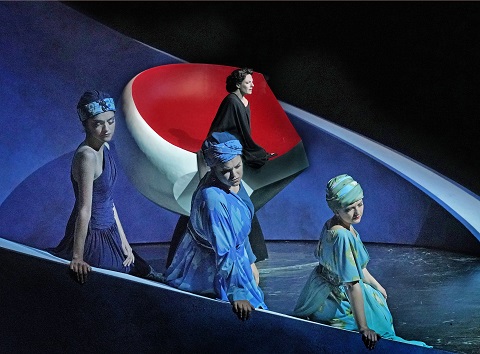 Samantha Gossard (Dryade), Meryl Dominguez (Najade), Amanda Echalaz (Prima Donna/Ariadne), and Sarah Tucker (Echo). Photo credit: Ken Howard for Santa Fe Opera 2018.
Samantha Gossard (Dryade), Meryl Dominguez (Najade), Amanda Echalaz (Prima Donna/Ariadne), and Sarah Tucker (Echo). Photo credit: Ken Howard for Santa Fe Opera 2018.
Mr. Hoheisels’ costumes, while visually appealing were more puzzling. He seemed to be contrasting a Music Hall look for the commedia troupe against a sleeker concert look for the royals. But then there were the uniforms of the household staff. The period didn’t seem entirely consistent even though it was visually satisfying. Thomas C. Hase designed some highly atmospheric lighting, straightforward in the prologue (complete with practical lanterns), moody and mythical in “the opera.”
Tim Albery directed, as well as providing the effective English translation for the Prologue (and for many stretches of interjections in Act II). While Mr. Albery’s basic traffic management was efficient and sensible, the rich detail often present in his work seemed in short supply. Aside from Jodi Melnick’s clever choreography, the action often seemed stuck in neutral. Most lacking was the realization of the unfolding relationship of Ariadne and Bacchus resulting in a loving unification, which, devoid of any palpable emotional connection, seemed to go for too little.
Happily, we could always simply rejoice that musically, some of the best interpreters around were treating us to a generous helping of vintage Strauss. Mr. Crosby, your legacy lives on.
James Sohre
Strauss: Ariadne auf Naxos
Music Master: Rod Gilfry; Major-Domo: Kevin Burdette; Footman: Brent Michael Smith; Officer: Jesse Darden; Composer: Amanda Majeski; The Tenor/Bacchus: Bruce Sledge; Wigmaker: Jarrett Logan Porter; Zerbinetta: Liv Redpath; Prima Donna/Ariadne: Amanda Echalaz; Dancing Master: Brenton Ryan; Najade: Meryl Dominguez; Dryade: Samantha Gossard; Echo: Sarah Tucker; Harlequin: Jarrett Ott; Truffaldino: Anthony Robert Schneider; Scaramuccio: Matthew DiBattista; Brighella: Terence Chin-Loy; Conductor: James Gaffigan; Director and English Translation: Tim Albery; Set and Costume Design: Tobias Hoheisel; Lighting Design: Thomas C. Hase; Choreography: Jodi Melnick